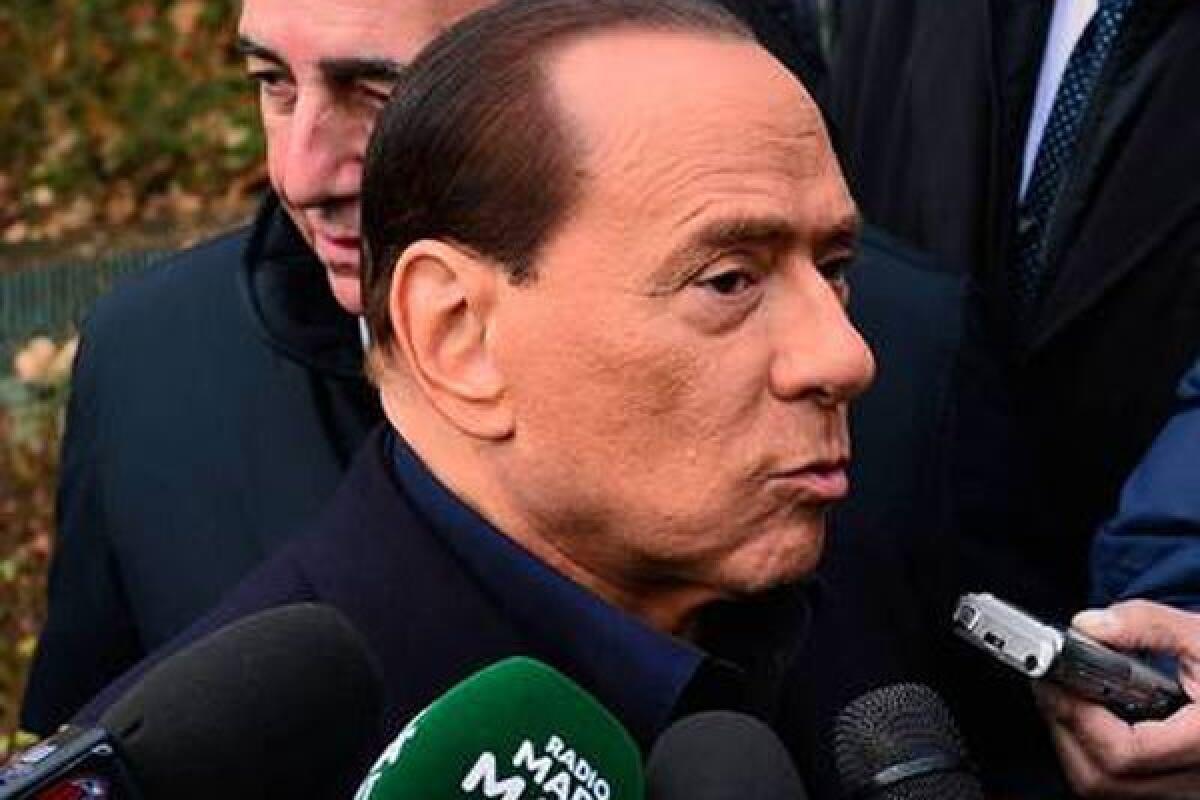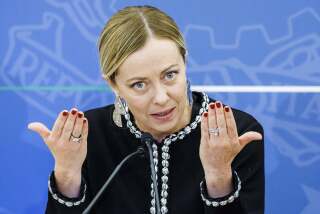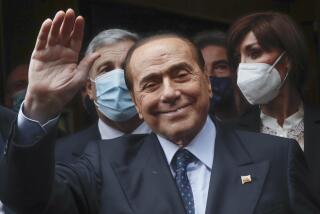In Italy, prospect of early elections brings uncertainty

LONDON — Turmoil engulfed Italy on Monday as the country braced for the imminent resignation of its prime minister, the intended comeback of his disgraced predecessor and the prospect of months of political and financial instability after a period of relative calm.
Elections originally expected to be held around April are now likely to take place in February, cutting short the present government’s time to enact measures aimed at reviving Italy’s moribund economy and bringing down its enormous public debt. That could boost the chances of another worrisome flare-up of the lingering euro debt crisis.
Like so much that has befallen the Mediterranean nation in the last 20 years, the lapse back into uncertainty was caused by Silvio Berlusconi, the flamboyant billionaire media mogul who was ousted as prime minister last year. Berlusconi, 76, announced Saturday that he had decided to seek another term as premier, after earlier vowing to retire from elected office.
That, coupled with his party’s walkout from the Italian Senate before an important vote last week, pushed his successor, Prime Minister Mario Monti, over the political cliff. Monti said that the withdrawal of Berlusconi’s support for his technocratic government made staying on impossible and that he would tender his resignation once lawmakers passed the 2013 budget, which is expected this month.
On Monday, speculation centered on whether Monti, who was appointed as an emergency prime minister rather than elected, would run as a candidate in order to take Berlusconi on head-to-head. Attending the Nobel Peace Prize ceremony in Oslo, Monti downplayed that idea Monday, saying he was concentrating on the immediate task of governing.
Some analysts said Monti’s decision to step down early was a clever way to call Berlusconi’s bluff and make Italians focus on what lies in store if Berlusconi is returned to the premiership. The markets, which in effect ousted Berlusconi from power in November 2011, took a decidedly dim view of his potential reinstatement: The stock exchange in Milan lost 2.3% of its value Monday and government borrowing costs rose, though to a rate still far below the dangerous peaks reached during Berlusconi’s final days as premier.
“Monti has taken the initiative, and it is [he who] can say when and what will happen,” James Walston, a political scientist at the American University of Rome, wrote on his blog. “We’re still a long way from the endgame, but with the election date likely to be at the end of February, we’re moving towards it.”
Since taking over as premier and appointing a nonpartisan administration, Monti, 69, has ushered in austerity cuts and labor and tax reforms to reassure investors of Italy’s determination to put its finances in order and pull itself out of recession. His sober demeanor and grasp of the issues also restored respect for Italy on the international stage, where it had become something of a laughingstock because of Berlusconi’s sex scandals and corruption trials.
Other European leaders, who had dismissed Berlusconi as a useless buffoon, welcomed Monti as a fellow decision-maker. At home in Italy, although his approval ratings have dipped because of some of his policy decisions, Monti still outshines rivals in the polls.
By contrast, Berlusconi’s center-right party is in disarray, trailing well behind the center-left Democratic Party that could prove the big winner in the next election. As current polls stand, Berlusconi has almost no chance of becoming prime minister again, but with a block of votes in Parliament, he could still exert influence on policy.
Berlusconi’s campaign is likely to center on criticism of the lack of economic growth since Monti took over; the former premier also says that Italy has become too subservient to the dictates of Germany. On Saturday, he declared he was reentering the race out of a “sense of responsibility” to his country.
Critics say it was more out of a sense of responsibility to Silvio Berlusconi, an attempt to continue trying to shield himself from allegations of corruption and misconduct. Since tumbling from power, he has been convicted in one corruption case — the verdict is being appealed — and faces trial on charges of paying for sex with a 17-year-old girl.
That trial was thrown for a loop when the girl in question, Karima El Mahroug, who is now an adult, did not show up to testify in court Monday. Police have launched a hunt for El Mahroug, who reportedly sent her lawyer a text message saying she was out of the country.
Prosecutors accused Berlusconi of trying to delay the trial so a verdict would not come in during the election campaign.
More to Read
Sign up for Essential California
The most important California stories and recommendations in your inbox every morning.
You may occasionally receive promotional content from the Los Angeles Times.











